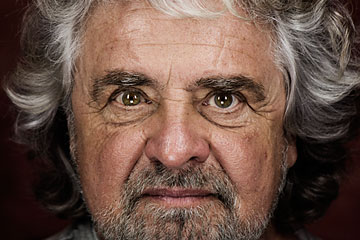
Beppe Grillo
The comedian Beppe Grillo, the leader of the party that won the most votes in Italy's February election, sits in his beachfront villa in Tuscany as Italian journalists crowd outside, desperate for a sound bite. "They film me while I eat, while I fart," says Grillo, with characteristic vulgarity. "They point their cameras at me 24 hours a day. If I need to pick my nose, I first need to go hide."
Nobody, least of all Grillo, expected his Five Star Movement to do so well. Campaigning on a radical platform, the 64-year-old satirist led what he dubbed a Tsunami Tour, visiting 76 towns in 45 days to urge Italians to vote for a slate of candidates who had never before held office. He triggered, if not a tsunami, then a sizable wave. Almost 26% of the vote flowed to M5S, as the party is widely known on social media, giving
its wild-haired, foulmouthed founder significant influence over the fate of the euro zone's third largest economy. "This thing here, it's like a virus," Grillo says of his movement.
Viruses flourish when patients are weak, and Italy, by some measures, has been at death's door for years. In the decade from 2000, the only countries that grew more slowly were Haiti and Zimbabwe. The austerity measures, forced down Italy's gullet by Mario Monti, the outgoing technocratic Prime Minister, came too late to offer a cure.
Across Europe, populist parties are benefiting as voters take revenge for decades of mismanagement. Italy's political class is especially weak, especially venal. But Grillo isn't just the beneficiary of public anger. In this most interconnected of ages, Italian politicians no longer know how to connect. Leveraging his celebrity and playing the Internet like a maestro, Grillo has shown them how it's done.
The election results sent world stock markets tumbling and Italian borrowing costs rocketing. Italy's Parliament appears deadlocked, with no party or coalition commanding a majority substantial enough to form a government. But as panic has subsided, a curious hypothesis has emerged that sees in Italy's predicament not just a threat, but also an opportunity. Old-style politics practiced by old-style politicians has failed again and again. Maybe, just maybe, the anarchic comedian with a penchant for the unprintable will shock Italy into real change.
A Web of Influence
In 2000, Grillo stood on a stage with his computer. "I thought it would help me save paper, books, paper, trees, the Amazon, my God!" he wailed. "And instead, I print, print everything." He ended the performance — one of the stand-up shows that made him famous — by taking a sledgehammer to the computer. "I was still analog," he says.
Grillo would not go digital until 2005, when he met a reclusive Web entrepreneur named Gianroberto Casaleggio. "He told me, 'Let's start the biggest blog in the world.' I didn't know what a blog was," recalls Grillo. Soon his blog ranked among the 10 most read blogs globally.
In 2007, he used it to organize a nationwide demonstration called Go F — - Yourself Day, collecting, in a single afternoon, 350,000 signatures in favor of electoral reform. Two years later, he launched the Five Star Movement. "I've gone from comedy to antipolitics, and now into politics, the real thing," says Grillo.
His foray into electoral politics may be recent, but his campaign is not very different from the comedy he's been performing for more than 30 years. In 1986, Grillo ended an appearance on one of Italy's public television channels with a joke about a recent visit to China by Italy's Socialist Prime Minister Bettino Craxi. An aide to Craxi asks of the Chinese, "If they're all socialists, from whom do they steal?" Grillo's reward was the first of several periods of exile from Italian TV screens, but he was vindicated when Craxi was investigated for bribery and corruption.
He has often proved prescient. "He had this ability to mix irony and rage and unite it with information," says Andrea Scanzi, author of a 2008 book on Grillo. The comedian built a rapport with his fans, who sometimes fed him tips. In 2002, he included in his comedy routine the accusation that dairy conglomerate Parmalat had amassed secret debts. When, a little over a year later, the firm collapsed, Grillo received a visit from the financial police, eager to discover his sources.
In 1994 corruption scandals brought down the Christian Democrat Party that had governed Italy for 41 of 48 postwar years. Its implosion made space for Silvio Berlusconi, who went on to govern Italy for 10 of the 18 years until he resigned in 2011 amid a welter of scandals and economic turbulence. The media mogul looked like a busted flush ahead of the election. Instead he did almost as well as Grillo. A master of traditional media — not least thanks to his ownership of a slew of TV stations and print publications — Berlusconi pulled in almost 22% of the vote.
Despite tarnished reputation and looming lawsuits, Berlusconi actually started the election season with a hidden advantage over Grillo. Italy's campaign-financing rules and electoral system favor incumbents. And it's a system that benefits coalitions. Berlusconi's party won fewer seats in Italy's lower house than M5S but controls more votes through its alliances. The center-left Democratic Party led by Pier Luigi Bersani finished with nearly three times as many seats as M5S, despite winning fewer votes, because of a mechanism that allocates additional seats to the largest coalition.
